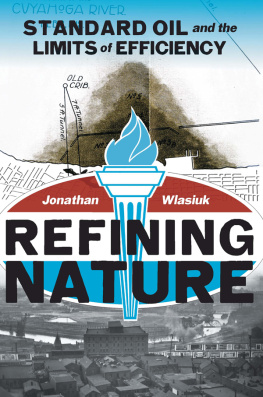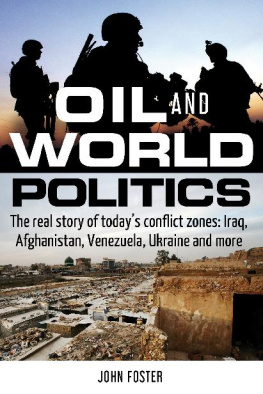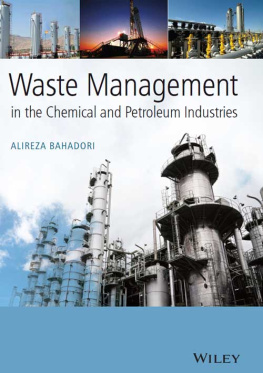Martin V. Melosi and Joel A. Tarr, EDITORS
COVER ART: Photomontage of map showing sewage deposits at the mouth of the Cuyahoga River, 1912, courtesy of City of Cleveland, Ohio, and an aerial view of a polluted Cleveland neighborhood, courtesy of the Western Reserve Historical Society, Cleveland, Ohio.
COVER DESIGN: Joel W. Coggins
ACKNOWLEDGMENTS
This book was born out of the rich seminar discussions I participated in at Case Western Reserve Universitys (CWRU) graduate program in the History of Science, Technology, Environment, and Medicine. The faculty at CWRU demanded the highest level of scholarship but encouraged me to tell this story my own way. Ted Steinberg guided me from the inception of this project just over a decade ago and was never shy to let me know when I was chasing a dead end. Dan Cohen ensured that I spoke to a broader audience, and Peter Shulman saved me from my own excesses. Jessica Green provided a perspective outside the discipline of history and encouraged me to dive deeper into the role of politics in the petroleum industry. My graduate school compatriotsLyz Bly, Sam Duncan, Jon Hazlett, and Ben Sperryspent countless hours in seminar rooms, cafes, and bars helping me shape the narrative that follows. At CWRU, this project benefited from the financial support of the Baker-Nord Center for the Humanities and the Encyclopedia of Cleveland History.
I also received invaluable criticism from the greater community of environmental historians. John McNeill championed my work and helped me negotiate the perils of converting a dissertation into a proper book manuscript. Brian Black and Christine Rosen offered valuable criticism on conference papers stemming from my manuscript. Lisa Brady, as editor of the journal Environmental History, made me appreciate the value of a diligent editor. My footnotes were a dumpster fire before Alex Wolfe and the copy editors at the University of Pittsburgh Press cleaned them up. Christopher Jones, Nic Mink, Alan Roe, and Edmund Russell steered me out of editing doldrums with new perspectives. Sandy Crooms has a generous heart and a knack for making sense out of chaos. It has been an honor to receive feedback from Martin Melosi and Joel Tarr for a book modeled on their own work.
I was fortunate to work with passionate archivists who were willing to invest time and effort in my personal quest. Ann Sindelar is the lorekeeper of the Western Reserve Historical Society and often brought sources to my attention that I never knew existed. Steve McShane has dominion over the Calumet Regional Archives and is desperate to share it with scholars. Tom Rosenbaum and the late Ken Rose opened the gates of the RockefellerArchives Center to me and let me know when donuts were in the kitchen. I also owe my gratitude to the staff of the Briscoe Center for American History on the campus of the University of Texas at Austin and the anonymous referees who provided critical comments on my article and book manuscripts.
My family, at times, felt as though they shared joint custody over me with this project. My wife, Annakiss Mauser-Martinez, patiently aided me in my most important discovery: the balance between work and family. My father, Walter Wlasiuk, came to this country as a refugee from a devastated Europe at the end of the Second World War. His grandsons, Aleksander and Sebastian, are a living reminder to me that although the past structures our present, the future remains unwritten.
INTRODUCTION
Although no corporation currently operates under the name Standard Oil Company, the old petroleum trust haunts the present. Despite a recent dip in oil prices, two of the top three corporations on the Fortune 500 list in 2015 are descendants of the Standard Oil Trust. Millions of Americans fill their gas tanks at stations operated by corporations that began under the Standard Oil name. Conoco, Marathon, Exxon/Mobil, and Chevron all constituted branches of Standard Oil before the Supreme Court, in 1911, sundered the trust into thirty-four separate companies. Once the largest refinery in the world, the massive industrial complex in Whiting, Indiana, operated by British Petroleum continues to refine crude oil 128 years after Standard Oil began construction. In the closing years of the nineteenth century, economists, historians, and biographers began to publish what has become a sizable library of books seeking to explain the companys command of a resource that would fuel the modern world. Standard Oil, as many previous studies argue, crushed competitors through superior organization, efficient refining techniques, and outright corruption. The Standard
Most students of history learn about the Standard Oil Company when their American history courses reach the Gilded Age, that loosely defined time period shoehorned in somewhere between the Civil War and the Progressive Era. Standard Oil and its shrewd architect, John D. Rockefeller, serve as a convenient illustration of the economic power of integrating every level of production into a single business. Students learn how the control of a resource from its source in nature to its final form as a commodity reduces costs, empowering a corporation to undercut competition and gain market share. If the company saves enough in production and maintains high quality, it can capture a market and emerge as a bona fide monopoly. Some corporations took this model to extremes, founding company towns that offered workers company grocery stores, company housing, and (often) a company government. Henry Ford famously established a company town in the heart of the Amazon to produce his own rubber, and George Pullman built Pullman, Illinois, just south of Chicago. Standard Oil founded its own company townWhiting, Indianain the last decade of the nineteenth century around the largest refinery in the world. The absolute control over workers and consumers made possible by company towns and monopoly seem more akin to feudalism than the supposed free markets of capitalism. Although many histories hail Rockefeller as the consummate capitalist, he believed the public are not benefitted by competition. Instead, Rockefeller envisioned an efficient utopia controlled by corporate conglomerates. In his own autobiography, published in 1909, he foreclosed on any alternative: It is too late to argue about advantages of industrial combinations. They are a necessity.
John D. Rockefeller sought to organize the environment with a missionary zeal from his earliest days. As a child growing up amid the farms of upstate New York, he once cut down a tree before breakfast because it
Although it created competitive advantages in the Gilded Age, the strategy of vertical integration confronted environmental and social barriers in the twentieth century that favored the outsourcing of resource production and transportation. This history of Standard Oil reveals why outsourcing various levels of production (what Bartow J. Elmore has called Coca-Cola Capitalism) became cheaper and politically convenient. Standard Oil, local governments, and citizens struggled to control the environmental consequences of drilling, transporting, refining, and selling petroleum. The corporate utopia of the company town collapsed under the weight of its own internal contradictions. The mass consumption and production at the heart of the twentieth-century consumer economy demanded an equally powerful mass destruction of environments, according to environmental historian Timothy LeCain. Here lies the dark side of scientific efficiency, for the same practices that squeezed every cent of profit from nature also streamlined the production of wastes. Refineries filled rivers and lakes with caustic acids and waste oils that killed fish, disintegrated the hulls of ships, and threatened public drinking water. Burning coal and oil to fire refinery boilers created a pall of smoke and soot so toxic that the city government of Cleveland, nicknamed the Forest City, somberly recorded the death of its last virgin trees at the dawn of the twentieth century. Kerosene lamps spontaneously combusted, creating a new incendiary landscape. Industrial production, in short, produced cascading effects within nature that blurred elemental lines as rivers caught fire, soot became airborne, and sickness infested some of the richest cities in human history. Standard Oil did not account for these environmental effects because they transcended property boundaries, which served as the horizon of their worldview. This book shows what happened when nature did not fit into these standardized plans; when efficiency confronted





